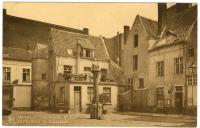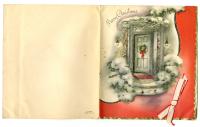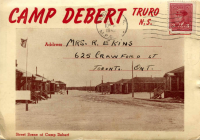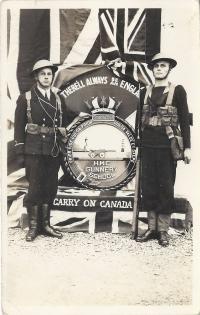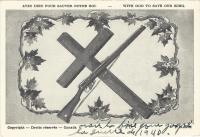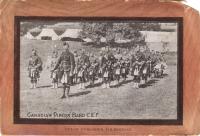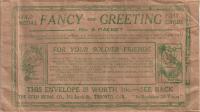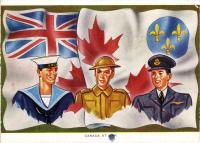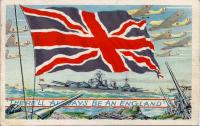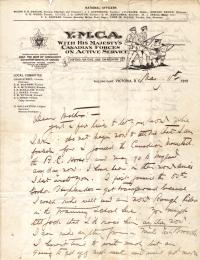Correspondence
Postcards from France and Belgium
A postcard from Antwerp, Belgium, depicting La Place de St. Nicolas. At the very center of the postcard there is a water pump featuring a statue of St. Nicholas at the top. This courtyard still exists today behind a church dedicated to this same patron saint. The sender made sure to assert the beauty of the city, despite the "poor picture".
The second postcard shows L'Hotel de Ville (city hall) and police station of Mazingarbe, France. This town is in the Pas-de-Calais region, Although it was a small village, its people "sure were friendly" according to the sender.
Samuel W. Tomlinson's greeting cards from service overseas
Samuel W. Tomlinson's collection of holiday and greeting cards from his service time in Kiska, Alaska, and overseas in Europe including Belgium and the Netherlands is a journal of the travels of one Canadian serviceman,
Postcards from Camp Debert, Truro, Nova Scotia
Postcards were a routine way of corresponding quickly with family and friends in the age before e-mail. This rare collection shows Canadian infantry training and recreating at Camp Debert in Nova Scotia, ca. 1942.
Carry on, Canada!
The imagery on the postcard might seem more suited to the First World War than the Second, but it indicates the strength of imperial sentiment through the 1940s.
Cross, rifle, and maple leaf
Military, religious, and national symbols mingled in this postcard produced during the Second World War for the Quebec market.
Greetings from Folkestone
Souvenirs like this one gave a rosy view of life in CEF camps during the First World War, with pictures of church parade, a battalion band, a visit from the King, and "a bachelor's supper party."
"Gladden the hearts of our heroes"
Soldiers overseas treasured mail from home, a fact that this Toronto company hoped would help sell its products during the First World War.
Army, Navy and Air Force
This lettercard, published early in the Second World War, gave users a thumbnail sketch of the three services and described Canada's Battle Flag, shown in the background.
"There'll Always Be An England"
This patriotic postcard of the Second World War used a line from Vera Lynn's famous song. Other cards in the series offered equally stirring images.
"Do not begin now to tell me that I am foolish"
An unidentified British Columbia soldier gives his reasons for enlisting in the 50th Regiment, Gordon Highlanders, describes his training with the British Columbia Horse, and mentions attacks on German-owned businesses in Victoria.

